#why would you kill david lynch :(
Explore tagged Tumblr posts
Text
perhaps it's understandable that david lynch posting is inescapable on tumblr dot com but babes can we be so for real about what his last few years were like (i.e. housebound and unable to work)? can we maybe talk about how the actions of most people directly contributed to that isolation?? can we perhaps consider that he was chronically ill & disabled, and thus discarded in the later years of his life, while we recognize him as a visionary artist??
#in an interview published summer '24 he talked about how concerns over catching COVID/other illnesses kept him housebound and unable to work#and unless you've never dropped COVID precautions since 2020 you contributed to that. sorry.#why would you kill david lynch :(#i just can't stand to see people wax poetic about him while their actions condemn people with conditions like his to isolation or death#david lynch
58 notes
·
View notes
Text
i've seen people talking about how drastic the change between cooper and audrey's relationship in s2 is and realize people don't know the lore.
regardless of how you feel about their relationship, the intention that the writers had in s2 was for cooper to fall in love with audrey. eventually this was going to lead to an affair. they have said this multiple times. aside from who killed laura palmer, their most popular storyline was cooper/audrey and when abc pressured lynch and frost to reveal the killer early (which lead to the show's cancellation) they planned to lean on anticipation of the storyline to get them viewership. mark frost has said that they planned on five seasons for twin peaks.
in 1990 kyle maclachlan was dating lara flynn boyle who plays donna hayward, lara became upset that kyle had so much chemistry with sherilyn fenn (who was 25 in real life) so their entire relationship is axed. not only any romantic scenes, but ALL their scenes. after 2x12 kyle and sherilyn never share any direct scenes together. kyle did share that he felt cooper would not have a relationship with 18 year old audrey which i agree with but then they come in and essentially recast heather graham to play a 20 NUN, barely older than audrey herself, to be his love interest in audrey's place. everything that happened with annie at the end of s2 is a placeholder for audrey. and i'm certain it's why we do not see annie in the return but come to find that audrey has been in a somewhat similar situation to cooper for 25 years. it's fascinating to say people say they don't ship cooper and audrey because of the age gap - a very valid squick - but still like their relationship and miss it when it's gone. it shows how their dynamic was embedded into the show and it does say something about dale cooper as a character that this was the original storyline.
it shows how much a network like abc cut what david lynch and mark frost were trying to say at the knees and how cutting off two strong storylines bc of behind the scenes stuff and what execs think audiences want really harms a show as popular as twin peaks can be it's demise. if they hadn't pressured david lynch to reveal the killer early, then they could have carried that on to at least season 3 and do the timejump they planned and who knows how differently we would remember twin peaks now.
#twin peaks#dale cooper#audrey horne#there are sources for all of this trust me#i was insane in 2014#made this unrebloggable bc this isnt a discourse thing#it's a this is a fact thing#otp: it's a deal
126 notes
·
View notes
Text
Sex With Spencer Reid All Seasons (season 3)
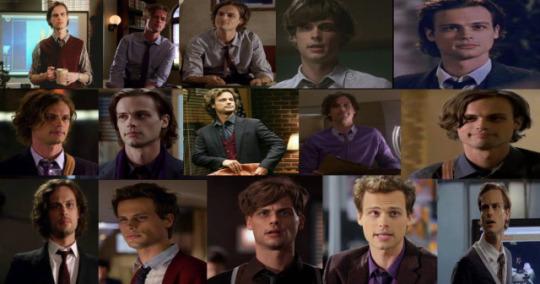
If you are under the age of 18, please do not read this story. Thank you.
This will cover what I believe sex would be like with Spencer Reid from season 1 to 15. Warning contains adult situations, Sex. Dirty talk, Orgasms, Crying, Spoilers for all seasons and Spencer Reid being a sex God.
Also includes fingering and oral sex. (Female receiving only.)
These are a little bit longer than I anticipated them to be because I wanted to give a back story as to why the sex is the way that it is for each season. To give it in depth feeling of why Spencer was the way that he was in bed that season. So I will be posting them by each season rather than all at once. I hope this gives you something to look forward to, and please leave comments, I will be leaving links to the next season below.
You are a new agent at the BAU and Spencer Reid's girlfriend, the one who takes his virginity and has sex with him for all 15 seasons and beyond.
Spencer Reid knew the first time he saw you walk through the doors of the BAU that you were the one that he was going to love forever. The first time you smiled, he knew it was the only smile that he ever wanted to wake up to. The first time he touched your hand, he knew yours was the only hand he ever wanted to hold. The first time he kissed you, he knew your lips were the only ones that he ever wanted to have pressed against his own. and the first time he made love to you, he knew you were the only one he ever wanted to do this with, and he also knew he would never be the same you or his life now, his love and his only desire.
season 1
season 2
Season 3
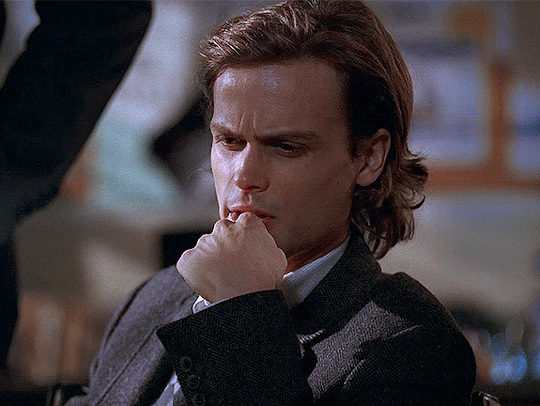
In Season 3 Spencer is getting used to the idea that he no longer has Jason Gideon and now has a new team member David Rossi. he obviously still misses Jason Gideon, as he was a very good friend of Spencer's. He's also a big fan of David Rossi's writing, so he's thrilled to have him be a part of the team. The team also thought that they were going to lose Penelope
During that time, she was shot by a killer who she thought was someone who liked her. even After Morgan advised her not to go out with this man, it resulted in JJ having to kill him. It also introduced Penelope to Kevin Lynch, the man who would eventually become her boyfriend.
In Season 3 Spencer finally decides to dabble in the world of oral sex. Something that shocked you since the way he feels about germs and touching people. But he never had a problem
kissing you. Or touching you in any way. So it really shouldn't have been much of a surprise to you. But you were both very eager to try it out. You knew that he had to be good at it, since he's
good at everything else. And you have to admit, since you lost your virginity with Spencer and had never had oral sex yourself. But you've heard about how good it is. And but judging by the
way that he licks his lips all the time, you know he has to have a skilled tongue. He waited until a night that he knew he was going to have the next day off so that he could spend as much time
with you as possible and practice this new skill that he was wanting to learn. He waited until the night that he knew you both had the next day off, so that he could spend as much time with you
as possible and work on learning this new skill that he's so excited to try. You laid in the middle of the bed and opened your legs wide for him, something that he always loved the sight of, but
tonight is even more excited for a different reason, since it's the first time he's actually going to taste you. "Are you ready?" He asked you looking in your eyes with love. When you shake your
head in pant yes, equally as excited as he is, he made his way down to the edge of the bed and licked his lips before licking you for the first time, a feeling that almost drove you right over the
edge. The moan that you let out caused Spencer to chuckle and look up at you. "Honey I've only barely licked your clit tip once and you're already ready to orgasm?". You panted and told him "I
can't help it. It felt that good God are you good at everything that you do?".
"I sure hope so" he told you before licking you once more. still not to sure of himself he keeps asking "how am i doing?"
"does it feel good, "are you enjoying it?" He was the best oral sex giver that you could have ever hoped for. The licking, the sucking, the way his thin long fingers slid into you with ease, making it feel
even better than you ever imagined, this moment was even more magical than you could have ever dreamed of. After he gave you four orgasms, he finally was ready to be inside of you.
Actually, he was ready to be inside of you after the first loud moan that you let out. Needless to say, the two of you enjoyed a very sexy and pleasurable weekend together before you were called the way on yet another case.
A case that would Threaten Spencer to spiral back into the drug world. A teen boy being killed in front of him. A boy who he tried to help but was not able to. Something caused by a girl named Lindsey, a girl who would haunt him later in his life.
Spencer ended up attending a meeting in hopes that he wouldn't reenter the drug world. Thankfully he did not re-enter the world of drugs and used his abilities to be able to save another young man Named Owen.
After Hotch talked with Spencer on the jet, Spencer really no longer felt any need to use the drug that once destroyed him.
Spencer was happy to get back home with you and get into bed. The one place that he always felt safe and loved.
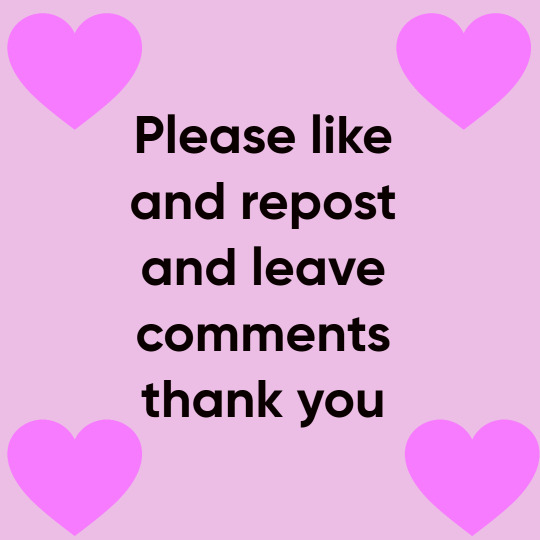
382 notes
·
View notes
Note
Just rewatched Blue Velvet and am crazy about the scene where Jeffrey sobs while remembering how he hurt Dorothy (at her request). Do you think Shiro ever feels terrible about the kinky shit he and Keith get up to? Sorry I love to suffer
Omg I rewatched that when David Lynch died a while back I am so sad, what a MESS!! LOL rip king
but omg!
I think, kinda yes???
But also I think that they’re such an unbelievably healthy couple and they know how to do aftercare?
I don’t want to like tackily ref my own fics LMAO that feels obnoxious but this was kinda what I was thinking about writing Zero Hour. I WOULD DO A LOT OF THINGS DIFFERENTLY IF I WROTE IT NOW, I’m not sure how it landed or aged or whatever LOL but I was trying to get at the idea that Shiro is feeling kinda squeamish about being rough after he’s been traumatized by so much violence - not just his captivity but also that he ALMOST KILLED KEITH!!!!!!!!!!!!
And in that fic like, they get through it by Keith being a demanding little brat about it and enthusiastically letting Shiro know what he wants and needs, giving him constant verbal permission, and also that they’re able to try it on in the Void where no one can get hurt!!!!!
I think in my mind I have kind of an idea that post-canon they both keep themselves super busy to deal with The Horrors—canon tells us that Shiro kind throws himself fully into projects & roles so that he can function, and I imagine it’s just the same after the war. But like, it doesn’t mean the trauma is erased. I like to think that the PTSD bubbles up from time to time, and that it can be unpredictable, and sometimes they can have hard days.
Nothing even has to happen—sometimes we just have hard bad days. Like I’m sure Shiro has days where he just feels like crying. And Keith probably has days where he reverts to being so prickly and unpleasant and doesn’t want to be touched. And yeah I just think, if we assume they’re a kinky couple (because why shouldn’t we LOL) maybe the dom drop REALLY hits bad some days.
And the hard thing about having hard days and feeling bad about yourself is that you wouldn’t be likely to seek comfort, right? So I imagine it looking like, maybe Shiro is kinda feeling off but thinks maybe some rowdy sex will make him feel better, but there’s such a post-nut-clarity crash, and he can see the red marks on Keith’s body and the scar on his face and he kinda tries to act normal like he’s gonna go shower or whatever and then just has a total meltdown in the bathroom!
Part of me wants to think that they know each other SO biblically like does Keith sense that something is off? Especially a Keith who maybe has moments where he’s so hyper diligent on Shiro’s safety! But maybe part of HIS recovery is not indulging every single danger ping because almost all of them are false alarms. Like how often do you throw the baby out with the bathwater by telling yourself that everything isn’t a crisis, and then you miss when it IS a crisis!!!!
And the issue also that like, it’s something that will compounds and compound and compound. Maybe Shiro is having a bad day -> gets triggered during/after sex -> the nature of his dom drop & self loathing means he feels guilty about being cared for and doesn’t want Keith’s help or comfort!!! He will draw into himself even worse!!! He will pretend he’s okay!!!!!!!!!!!!!!
You know what fic I think about so fucking much? everybody wants to be a cat by ailurea and its remix fic property of takashi shirogane (the meow for me remix) by sugarcubeshiro. LMAO I THINK A LOT ABOUT THIS PART, WHEN THEY REALIZE THEY’VE BOTH BEING DOING KITTY PLAY BECAUSE THEY THOUGHT THE OTHER ONE WANTED TO:
“I—I like it—I like you—“ Shiro is red. Very red. He hides his face again. “Ugh. It's really hot while we're doing it but it's also really embarrassing to think about after.”
IT’S REALLY EMBARRASSING TO THINK ABOUT AFTER LOL isn’t that the fucking truth about our most disgusting kinks?
So anyway also. Imagining Shiro splashing water on his face, taking a Xanax or whatever, getting into bed and faking it long enough to fall asleep, and then avoiding Keith all day at work and just feeling awful about himself.
UGH!!
They need to work on it!!!
I feel like, my taste is generally for like, more fucked up ships? And Sheith is so unbelievably wholesome, but they’re both so fucking traumatized. And I like the texture of that, I like knowing that they can figure it out and they’ll be okay and find a way through but there are also so many broken pieces making a mess for us to play with in the meantime. :)
8 notes
·
View notes
Text
I'm grumpy about Silent Hill again...
TW for discussions of suicide, self harm, abuse (both parent to child and amongst peers) and general spookiness. Y'know... the usual Silent Hill rigmarole of trauma and despair. Also be warned that I'm going to spoil a lot of the Silent Hill series, in particular Silent Hill 2 and the Short Message game that just came out. ***
So... one of my most popular posts out there is this one. It's about Pyramid head and the loss of subtlety in media. And I couldn't help but feel like we hadn't moved an inch from when I posted that back in... *checks date on post* hrrk. my bones... 2017. I'm going to die soon. Anyway. Today I watched Second Wind do a run of the short, free-to-play Silent Hill: Short Message. I admittedly had a good bit of trepidation going in just because of the marketing. Which, for all of you marketing majors out there, that is called "Not a good sign." Marketing should make you want to play a game... especially if you're a fan of the series already. But this... it was a bit of a wet blanket, largely due to the fact that it spoiled a lot of the focus of the game. It basically said "this is a game about how bullying and being chronically online is real bad. We're gonna be spooky about it now." And... straining to push aside how incredibly reductive that is... why give it away? Why say it out loud? Why did you tell us what you are doing? Can you imagine Silent Hill 2 if we'd known it was about James killing his wife from the jump? We didn't. We hadn't the first clue. We knew nothing other than that he was looking for her and she was maybe dead? But we didn't know how... possibly lung cancer or TB given that she had the most pointed coughing sequence since the movie Tombstone. And hey... the last game had someone looking for a loved one too. Maybe that's the deal with Silent Hill. Who knows? No one did at that point. It was still a big old mystery for the most part. And then the E3 trailer... like there's the weird pretty lady in jail? But what's she talking about? Who the fuck is Mary? Is that... his wife? Well then who the hell is Ms. Miniskirt? No wait... is that his wife in the VHS tape? What the hell is going on? Oh look gameplay! And... a little girl? And a weird guy with a gun... This soundtrack slaps. I'm gonna go see if it's up on Napster yet. (this was 2001... again... my bones etc) I remember combing over low-res copies of that video for HOURS when it came out. Why are the nurses different? It's not snowing? Who are all these people... And why do they all sound like they put ketamine in their coffee. It was like a great big puzzle to work out and we had a ball theorizing and researching so when it came out we were HYPE. And that was largely because in short... we knew SOME things at release. Fog. Nurses. Big stick. Weird people. Banger soundtrack. Dead (but probably not) wife. And we presumed or supposed more... cult activity? New beasties? Radio maybe? But we effectively knew nothing about the plot. And the best part was, while they had a solid hook (Find dead lady who we love so huggy buggy much) and instant intrigue (Angela in the cemetery being weirder than a film by David Lynch), and a very familiar setting (we may have improved draw distance on the PS2, but we don't have to use it!), we still didn't really know what was going on. The plot was essentially unfolding out of a black box. Silent Hill 2 was quite content to be a slower burn than trying to boil the Lake Superior with a signal flare. You don't even see the main "villain" Pyramid Head until a few hours in and, as I pointed out in that other post, there's no flashy cut scene to introduce him and go WOOOOOO SCARYYYYY. He's just chillin' behind some prison bars (which that totes is normal in an apartment complex) and staring at you like I stare at the inside of my fridge when I really would like some cheese to materialize.
And then... like we're not even really sure what the hell is going on for the longest time. We meet our wife's hot twin with the key to a strip club and she keeps getting killed over and over... and things keep getting increasingly rapey and lewd in a way that's just uncomfortable more than anything... But even at the end. Even with the big reveal of "You killed your wife." they still don't ever explicitly state "And you killed her because you couldn't have sex with her anymore." It wasn't until you finished the game, and talked to someone else about it, or let your brain cook on it for a bit that you went... heyyyy... he's a horndog! (In fact... if I'm going to chide SH2 for anything it's that right at the very VERY end they tried to frame James's actions as understandable because the woman who was dying and frightened and in pain was mean to him. Yes, being a caretaker is hard. But Christ... pick a topic for discussion.) But contrast all that with Short Message. The marketing and such all said out loud "THIS IS ABOUT BULLYING" so even going in... I was already like "yep. The bully is probably us, but we had reasons because we have to be complicated and you aren't allowed to make the player feel bad" And lo was I correct. There was no... intrigue. I was never curious about the character or the people around her because I knew this story. They already told me what story they were telling so I could practically sing along, especially as a millennial that had to grow up watching little videos and skits in school about the evils of bullying. And when you are going to tell a trope-ish story, and you tell the audience what the trope is, it becomes "say the line" writ large. This isn't me advocating for super twisty unexpected plot arcs (looking at you, Supernatural). Far from it. You absolutely should tell a story in such a way that the audience understands how you got from point A to point Z, even if there are some surprises along the way (See Sixth Sense for that masterclass). Rather, what I'm missing from this (and frankly a lot of the Silent Hill games and honestly... media in general these days) is a sense of restraint. A sense of trust in their audience to "get it." They can't just plonk us in the fog with a radio and a stick and say "You're here to find your best friend/dog/cousin/wife/business partner. Good luck. Here's a weirdo to prattle cryptically at you in order to unsettle you immediately. Bye!" No! They have to tell us what kind of story they're telling and what themes are important. They can't just... give us a Silent Hill Game and trust that we know what to do with it. It's... insulting frankly. Especially as a longtime fan of the franchise who remembers when they did trust us and they did have faith in their work. I will say this in compliment to Short Message. The environment design was pretty cool. Especially the sticky-note hallways... they looked like leaves... and sometimes teeth... and like tightly packed bones in an ossuary. It didn't... say anything really. But it looked cool. And you can't go wrong with Akira Yamaoka's soundtrack. But... while I'm on the subject of design. Y'all. An animate sakura tree in an oversized hoodie is not scary. But bless you for at least having the restraint to not make her Pyramid Head.
#silent hill#silent hill 2#silent hill 4#silent hill short message#horror#writing#story telling#suspense#video games#video game design#horror games
31 notes
·
View notes
Text
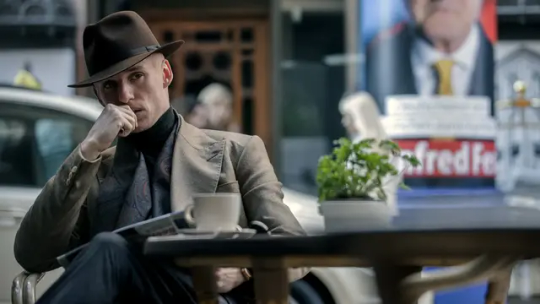
Inside The Day of the Jackal, Eddie Redmayne and Lashana Lynch’s ambitious new hitman series
GQ speaks to the cast and crew behind Sky’s reimagination of the classic Frederick Forsyth assassin novel
By Jack King26 July 2024
1973’s The Day of the Jackal is one of those classic thrillers that dads pass down as a rite of passage. Failing that, you might’ve caught it on ITV 2 on a lazy Sunday afternoon. Edward Fox plays the titular Jackal, a killer for hire who is commissioned by the French militant far-right to assassinate president Charles de Gaulle in 1963. The film’s first act savours his scrupulous attention to detail: buying a bespoke rifle that can be broken down into innocent parts, and fake documents from a forger, for example, who he murders with his bare hands after an ill-judged extortion attempt. He’s a shapeshifting lone wolf — well, jackal — we learn little about, aside from how good he is at killing people.
Such a rich character whose mark is felt on no end of hitman movies (see David Fincher’s 2023 genre homage The Killer) is ripe for reinterpretation. Not that it went especially well last time: the last, loose attempt to contemporise The Day of the Jackal came in 1997, starring Bruce Willis and Richard Gere, and the critics called it a dud. But 27 years later, Sky & Peacock have armed up for their own present-day reimagination of the source material, thrusting the Jackal into our fraught world of political division and ever-present global danger. The script was written by Top Boy writer Ronan Bennett, and the series executive produced by Downton Abbey's Gareth Neame and Nigel Marchant, alongside its stars Eddie Redmayne and Lashana Lynch.
“We both loved the book, and we saw the film when we were kids — I’ve seen the film many times through my life, and always really respected it,” Neame, alongside Marchant, tells GQ. While they were at first cautious to tackle source material that carries with it such esteem, to expand the story across episodic TV seemed too good an opportunity to turn down. “It’s such an iconic, gripping story, that to revisit that in a contemporary context, with all the benefits of a multi-episodic show … we thought that would be really interesting to take this much-respected IP and develop it this way.”
Marchant concurs. “I think that [this] kind of title is in so many peoples’ consciousness … And then yeah, what’s the benefit of telling this with a bigger canvas?”
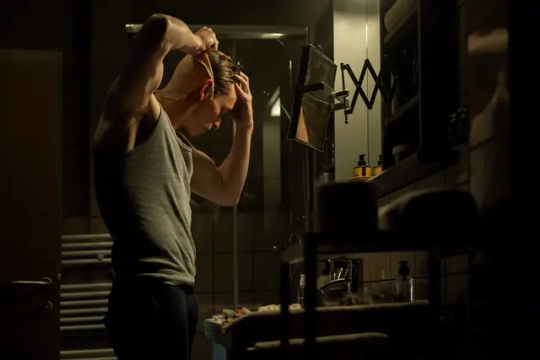
Marcell Piti/SKY/Carnival
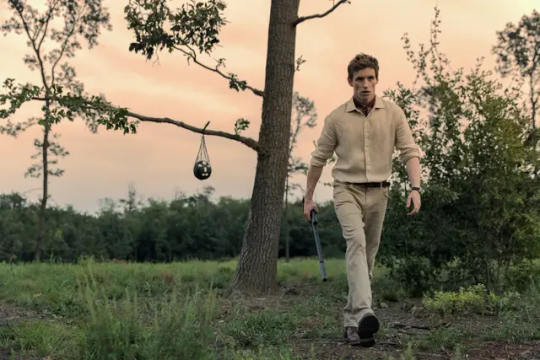
The most obvious difference about this version is that it takes place in the modern world. “If we’d stayed in the past, why do it? You can’t better the film,” Neame says. But in classic The Day of the Jackal style, Redmayne’s hitman still rocks up to more European cities than a gap year interrailer.
And so we begin the series with the Jackal in Munich. Not that we immediately recognise him: he is decked out in wrinkly prosthetics, fake hair, and wears contacts and fake teeth, disguised as an elderly German janitor. This is his way past security and into the campaign headquarters of a divisive far-right demagogue, for the purposes of a mission that we daren’t spoil further. Once he has done what he needed to do — ruthlessly dispatching half the staff with a silenced pistol en route — he makes a daring escape by absailing from the roof, just as the police arrive. So, to illustrate the vibe: think Mission Impossible meets Daniel Craig’s Bond, if he went really rogue.
It’s not a one-to-one adaptation, but fans of the original text and film needn’t worry — there’s a distinct air of reverence for them both throughout, and this version broadly covers the same plot beats, though the story is expanded for TV. As for the Jackal himself, Redmayne’s performance both evokes Fox’s classic turn and feels of his own making. “[Fox’s] performance will always be in my mind, because I loved it so much as a kid,” Redmayne tells GQ. “But at the same time, I wanted the audience to be able to oscillate between this sociopathic coldness, and a human being who wants a life, and happiness.” He points to Natalie Humphries’ costume design as an explicit example of homage. “She spoke specifically about the kind of dandy, slight peacock-y quality of the [original] movie, and how we wanted to keep those elements,” Redmayne says.
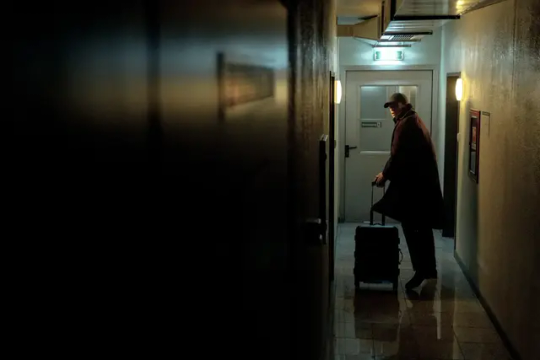
“If you know the original [film], you get these Easter eggs through the show — even some of the lines are exact matches, and scenes were shot literally shot-for-shot from the original,” Marchant says. “So there are treats along the way if you know it, which felt important to us [with] our love of the original as well.”
Some time after that first job, the familiar story begins, after a mysterious would-be client on the dark web offers the Jackal retirement-grade money for the biggest hit of his career. (Given the contemporary setting, the target obviously isn’t Charles de Gaulle, but that’s as much as we’re allowed to reveal.) And throughout the series, in another noticable departure from the source material, we delve into the Jackal’s backstory and the whys and wherefores of his chosen career path. (Again, I’d love to say more, but there’s a red laser dot hovering over my chest and I value my life.) Redmayne was initially cautious about digging too far into the Jackal’s background — traditionally, the whole point is that you know nothing about him — but was won over by the script.
“Edward Fox’s performance is so brilliant because it’s two and a half hours of [an] extraordinarily charismatic enigma,” Redmayne says. “So my challenge, as a fan of that, was to go, Wait, I only want to take this on if I feel like there is a way that unpacking [the backstory] doesn’t feel glib.”
The chance to explore the Jackal’s past, Neame says, was always the point. “We knew right from the beginning that we wouldn’t make a 10 part television series where the main character is only ever a ghost,” he says. “So that’s where the whole idea of the private life, the personal life — the fact that he’s trying to juggle this extraordinary professional world with a normal lifestyle [came from].” Later on in the series, Neame notes, another character tells him what should’ve probably been blindingly obvious: in this line of work, a healthy worThe Day of the Jackal isn’t just about the titular contract killer, of course. Much of the story unfolds as a thrilling cat and mouse, as hot on the Jackal’s heels is the Sherlock to his murderous Moriarty, French detective Claude Lebel, played in 1973 by Michel Lonsdale. In this new adaptation, the character is reimagined as a wily MI6 agent, Lashana Lynch’s Bianca, whose counter-terrorism training and firearms expertise make her the Jackal’s ideal foil. (Despite the connection you might make to one of Lynch’s more recent roles, this grounded, bureaucratic vision of His Majesty’s secret service bears little resemblance to Bond.)k/life balance just isn’t sustainable.
“When you have a character that is in either a powerful position, or works for a powerful organisation, there is this danger that happens whereby women get boxed into one of two things: either the strong one, or the damsel in some way. Both of them are actually unfair,” Lynch says. “The Bianca that I read in the first three episodes was someone who had a strength that was born from vulnerability, had confusion [around] her own identity and her meaning to her work … There was so much within her world, and within her being, that felt like a real person.”
Bianca is seen as an irritating disruptor by the people she works for; early in the first episode, her boss scribbles a mid-meeting note calling her a pain in the arse. But her unrelenting drive and commitment soon gets results. “She pushes people’s boundaries. She is annoying. She does not stop. And her boundary pushing gets very dangerous,” Lynch continues. “But [she is] also really well intentioned. She has a good heart, she just doesn’t know how to use it. Which is exciting to play, and exciting to watch.”
Ultimately, the Jackal and Bianca have more in common than they might initially realise. “The entire premise of these two protagonists that are deeply flawed human beings, and yet also compelling human beings who are kind of mirroring each other, and yet on a one way path to collision, I found that interesting,” Redmayne says.
“You’re on side with both of these people, despite the horrendous choices they’re making.”
The Day of the Jackal will premiere on Sky and streaming service NOW in the UK (and Peacock in the US) on 7 November.
https://www.gq-magazine.co.uk/article/the-day-of-the-jackal-preview
#eddie redmayne#the day of jackal#peacock#new look#new article#gq magazine uk#sky#now tv#eddieredmayneedit
11 notes
·
View notes
Text
Even more movies I've watched lately
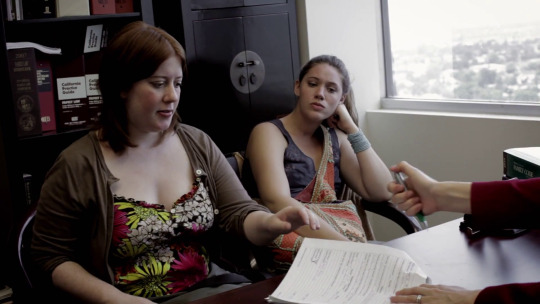
Absentia (2011): This movie is fine (and bleak), but it felt especially cheap, almost like something I should be watching on YouTube. This is because, according to Wikipedia, it was funded via Kickstarter. I used to have the same sheets as the Christian sister, Callie. One of John Bauer's charming troll illustrations turns up around 1:20:20. I suppose the lesson is "never give food to homeless people," or maybe "if you find a man with a deathly pallor collapsed in a tunnel who incoherently pleads with you about something, take his words extremely seriously"

Inland Empire (2006): David Lynch's final feature film. A scary man named Krimp looms in his front yard with a light bulb in his mouth. A surprisingly large portion of the dialogue is delivered in fake Southern accents. I know I'm supposed to say the film is a moving, visionary masterpiece from a genius, but despite enjoying the start, I don't think I've done enough Transcendental Meditation to "get" this one. I'm too far outside, well, whatever language this film is speaking and Lynch's religious understandings to care much for or about this film. (I have never seen people take this angle, but imo Lynch films tend to be highly religious, or rather, rooted in a particular religious cosmology involving intersections of dream universes. Imo anyone who isn't reading them with some of this religiosity in mind is overlooking an essential quality.) I suppose the lesson is "movies and reality are different"

Full River Red (2023): Despite the title, there is in fact a blue filter over a large portion of this very blue movie. My opinion changed over the course of the run time. At first, I thought it was bad. Then it became compelling. Then it wasn't merely compelling but nonstop great moments that retroactively improved and deepened the earlier scenes. Then it was shocking and viciously violent and still great. Then it became kind of silly. Finally, it's mediocre. Feels like it ends at three points but has to keep dragging on instead until they could contrive an over-the-top patriotic conclusion. It would have been a 9/10 if it only ended earlier, but instead it's probably more a 5/10 or worse. Like you don't need to actually show Qin Hui losing directly--the audience knows he lost in the long run because his name became synonymous with "traitor." Anyway, regardless of what Sun Jun says at the finale, the assassins are ABSOLUTELY there to kill Qin Hui, not to force him to recite a poem. That stab we see is a stab to fucking kill him. You saw it too, Sun! I suppose the lesson is if you are a patriot in the end, any amount of previous murder, torture, betrayal, or threatening Yaoqin with gang rape can be forgiven

Blue Gate Crossing (2002): Ironically, this one is NOT blue. A growing-up movie. Kerou's friend Lin Yuezhen is stalking her male classmate Shihao and stealing his possessions, including his shoes, as all normal girls with a crush would. Shihao swims a lot. He is a real charmer who gives his buddy money to masturbate in public, but as we get to know him, we see he also has plenty of energy to be unpleasant to Kerou as well. He becomes persuaded Kerou is the one who likes him and falls for her, which leads to some awkwardness. Kerou seems to hit on her adult PE teacher at one point. The big twist is that Kerou is actually in love with Yuezhen, but as with most things in the film, nothing much happens as a result of the lesbian twist. I suppose the lesson is if you follow and pester someone often enough long enough and never take no for an answer, you're really kind

Lupin III: Goemon's Blood Spray (2017): This one is disgustingly violent. I don't know why Goemon didn't just kill Hawk. Goemon showed NO mercy to the gangsters! None! What makes Hawk worthy of sparing? But I guess unpleasantly inconsistent narrative ethics are the bread and butter of this Woman Called Mine Fujiko-type Lupin stuff. At least there's no rape. I suppose the lesson is "If you turn off all your senses and stop feeling pain, you can keep fighting even with your arms chopped open." I apply this wisdom in my daily life very often. (If only I could just make pain stop)
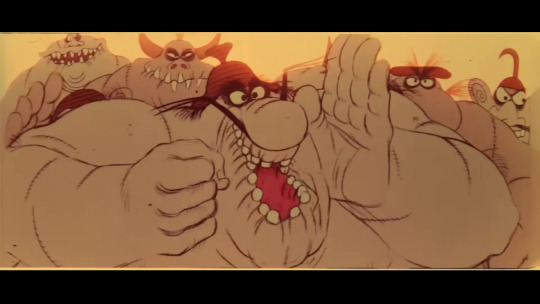
The Thief and the Cobbler Recobbled Cut (2013): Richard Williams's uncompleted life's work. A sensory overload film. While the film displays technical excellence and many gorgeously stylized visuals, I cannot imagine putting so much effort into such a mediocre, vapid story! The story, of course, is the scaffolding that the animation, the real star, is hung up on. Being a showcase only for technical skill, the movie is not very entertaining, either. Watching a painstakingly animated slapstick sequence of the Thief, I'm not gasping at the impressive, mind-boggling visuals but wondering when this interminable nonsense will end so we can return to the cardboard-cutout characters advancing the paper-thin plot. Even the climax is not a showdown against the evil Zigzag or the One-Eyes (the villains) but a ludicrously protracted Thief-bouncing-around scene. Tack, the cobbler, isn't even given the agency to intentionally defeat Zigzag: it has to happen by mistake, in an instant, and then the movie keeps staggering on and on and on anyway to show off technically incredible work with no drama or substance. Just exhausting animation for the hell of it. Zigzag dies a rather gruesome death for being the only entertaining or fun character, especially when the ruthless conqueror who has actually killed tons of people apparently doesn't even die but instead gets sat on by a bunch of large women, which is more of a reward than comeuppance if you ask me. I suppose the lesson is that even if you are a master of your craft, perfectionism can get in the way of the qualities that most matter in art. Wait, that might legitimately be the lesson
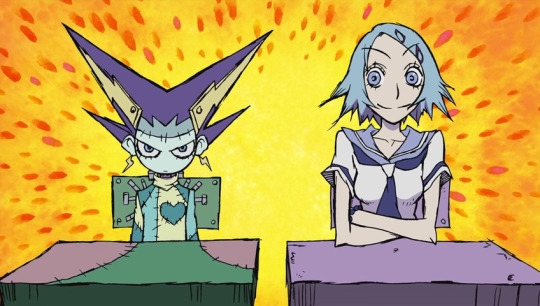
Hells (2008): The first half of this animated movie is irreverent, madcap, hammy. It's crude, it's violent, it's ridiculous. The opening shot is a cherub's anus while a voice screams that everyone goes to Hell when they die. The scenes are so explosive and rapid-fire that many of them seem to cut off before the scene is actually over (but hey, it's not boring). Though not as well-written or super-sexualized to the nth degree, Hells was reminding me of Kill La Kill. Then comes the big reveal and the villain powers up. Suddenly the setting totally changes for the rest of the movie, the established character arcs and relationships come to a dead halt and most of them reverse, the tone becomes extremely sincere, and the movie degenerates into a tedious chain of monologues about the power of faith and redemption (albeit in a rather non-Christian way). The ending also feels like they forgot what happened earlier: why are they rebuilding the abusive, terrible school? They didn't learn jack shit there. Did we forget the scene where the headmaster sexually tortures a student on a roulette wheel? Why the hell are we now acting like the school was a bastion of inspiration and hope that saved everyone? Madcap entertainment gives way to a back half where I'm begging the movie to end. No wonder Hells is forgotten. The lesson is that love and faith in people is more powerful than God
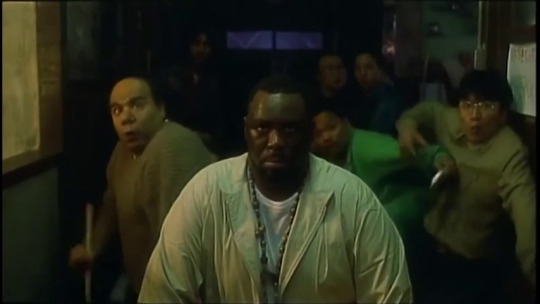
World Apartment Horror (1991): Directed by Katsuhiro Otomo, story by Satoshi Kon, screenplay cowritten by Keiko Nobumoto (creator of Wolf's Rain). Whoa! Is it awesome? No. I kept hoping, "Please don't be a story about how a bigot learns not to be a bigot because minorities are nice to him." But then it was. Even after the bigot attacks him with a chainsaw (!), the literally magic Black man remains steadfast and compassionate. But then it kept going long enough to be slightly more complicated. Another big problem is that the "horror" stuff is barely present until about an hour through (more than halfway), but at this point the script acts like it's been going on a while regardless. They should have showed us the protagonist's deterioration instead of just cutting from him being his usual dumbass self to him already being haunted/possessed. Really takes you out of it. The lesson is that revenge for genocide is wrong but maybe you need a supernatural being to defend yourself from racists even so. Apparently there's a manga version of this too
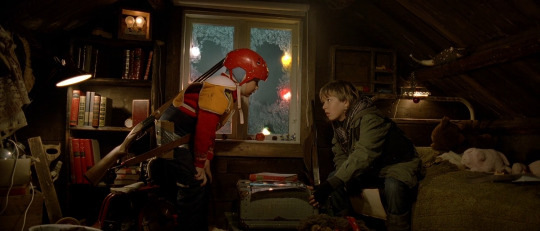
Rare Exports (2010): Surprisingly enough for a film involving murderous magical naked old men abducting children to ritually torture for Christmas, I'm disappointed it wasn't weirder. There is not a single woman anywhere in this film. The male characters are seemingly incapable of affection, tenderness, or kindness. Like you keep suspecting maybe someone will be nice a little bit, but nope. The world is brutal. I guess the meme that says Finns are "weird and sadistic" is true. I kept thinking how many of the children being swung around by the helicopter at the climax must be puking or passing out or screaming their lungs out. Speaking of the climax, why does Piiparinen know how to pilot a helicopter? Maybe I missed a setup for that. Or maybe the setup got cut
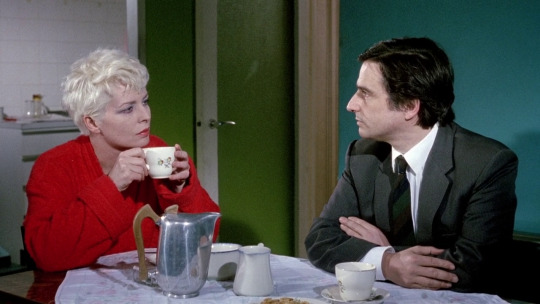
I Hired a Contract Killer (1990): This being an Aki Kaurismäki film, the actors can rarely tear themselves away from guzzling alcohol and smoking, and primarily speak in terse, austere, odd statements delivered awkwardly. Often feels like dialogue in a fairy tale. My favorite moment is when two ruthless hitmen earnestly, passionately attempt to persuade the protagonist (Henri) to love living. "But life is beautiful!" one hitman tells Henri. "It's a gift from our Lord," says the other. The lesson is cigarettes, booze, and sex make life worth living, but also, cigarettes will kill you. Though the cancer in the film is stomach cancer, actually, so maybe not
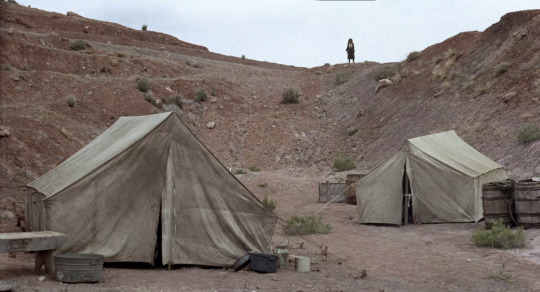
The Shooting (1966): All these years, those Sergio Leone spaghetti westerns have taken up so much cultural space. Meanwhile I never heard of this western, which is better: more interesting drama, more interesting characters, less egregious day-for-night scenes. (Still slightly egregious.) Real good. Tense, even scary. The lesson is there is no amount of money that should be enough to go into the desert with a shady stranger
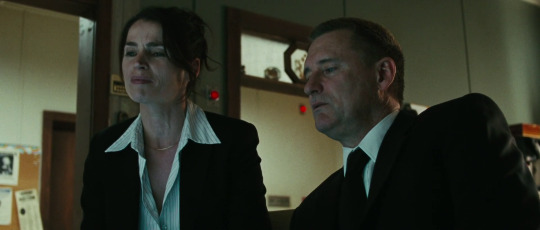
Surveillance (2008): With David Lynch's recent passing, I was thinking with some regret that there aren't more David Lynch films. Then I thought, well, I've never seen any film his daughter Jennifer Lynch was involved in. So I watched Surveillance, the second film she directed, the first being critically panned and, more importantly, sounding so disgusting I don't want to watch it. Surveillance was pretty disgusting too, it turns out. Of course it's unfair to expect Jennifer Lynch to be like David Lynch, and Surveillance, despite what you might guess from the gist (extreme and bizarre violence, FBI agents investigating a serial killer, etc.), is really not like a David Lynch film whatsoever. It matches the level of depravity in his films, except with zero mysticism or love, only cruelty and nihilism. You don't leave even Lost Highway feeling like it presents a desolate, hopeless universe. You do this one. Basically it's about the serial killers from The Reflecting Skin (1990) I mentioned in my previous movie post
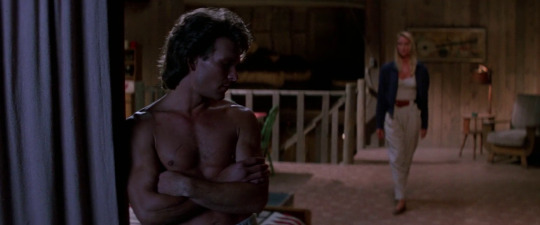
Road House (1989): I watched Road House because on a certain podcast one person said this cult classic is a movie with no good guys, and then the other person said it's a quintessential story of good versus evil. It tells the tale of a bouncer martial artist named Dalton who can rip people's throats out with his bare hands. One day he gets hired to clean up the Double Deuce roadhouse, which is rife with violence and crime. Then he starts flirting with the doctor who is stapling the open knife wound on his side. I kept thinking that if there was a Streets of Rage movie, it should have exactly the same mood as this. Then I got thinking I could write an awesome Streets of Rage movie if I learned how to write screenplays. The ending is probably too happy (no way is Elizabeth going skinny dipping with this guy like everything is fine), but so is the ending to Taxi Driver, and that movie is so serious and realistic up to that point that it ruins the movie, but people still consider that a classic. The lesson is that snitching is bad
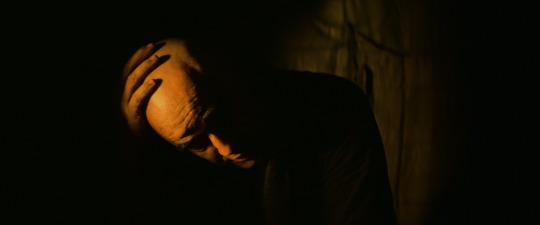
Apocalypse Now Final Cut (1979/2019): How little the story cares about Vietnamese people hit me a lot harder now than when I saw a different cut when I was a teenager. Somehow, murdering a Vietnamese family in cold blood for no reason toward the midpoint is treated as less traumatizing or severe than murdering a brutal warlord at the climax. I doubt it's exactly unrealistic, but man, throughout the story Vietnamese people are slaughtered, blown up, and denigrated with slur after slur, yet the script never takes the time to even once have an actual Vietnamese character partake in the story. Somehow there's time for a colonial French plantation owner (!) to share his perspective about "his" land, but no time for his all-Vietnamese servants or some ARVN guy or, God forbid, Vietnamese civilian to get a drop of character development. Hell, why is it that the main guy talking to Willard in the Kurtz sequence is a white American, while not a single person in Kurtz's overwhelmingly indigenous army ever speaks a word? I bet at least a few of these people know English if they're taking orders from Kurtz. Also, the finale apparently depicts an actual ritual butchery of an animal carried out by real indigenous people (specifically Ifugao, who are totally unrelated the highlanders they portray in the film). Pretty messed up to use a real practice by a real, contemporary indigenous minority group as a metaphor for primal ancient brutality and violence. Guess it's hard to scrub the racism from Heart of Darkness. I hope those extras were paid well at least. Anyway, despite all of that, this is one powerful movie! Cinema magic
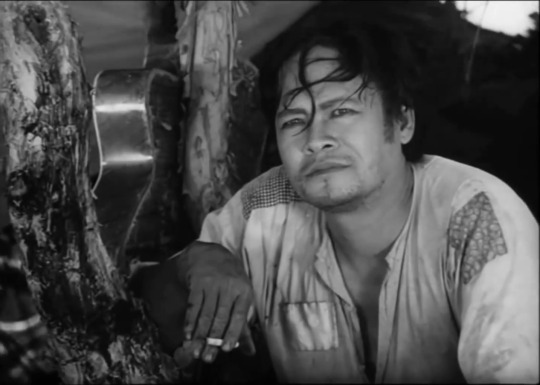
The Abandoned Field (1979): This one was a pain to find. Cánh đồng hoang, directed by Nguyễn Hồng Sến. The version on Internet Archive is a VHS recording and unwatchable. I never found a version with no compromises. Anyway, here's a Vietnamese war film that came out the same year as the (original cut of) Apocalypse Now. Certainly lower budget. It's a bit propaganda-y, and it has the issue of all the US soldiers being played by (I assume) Vietnamese actors who happen to have American-style haircuts. Biggest problem is the baby. Babies can't act, and this baby keeps staring into the camera and never behaving the way the baby should behave in the moment. Just looks confused and scared the whole time. They should have told the same story but with a kid old enough to act properly, though it would mean they'd have to write the kid as a more developed character. Anyway, it's still a thoughtful film. Get this: the Viet Cong characters have motivations and dialogue! Amazing! Viet Cong agents Ba Do and Sau Xoa raise a baby in a tiny shack in the Mekong Delta, the last Vietnamese in the area after the US forcibly relocated the other villagers. Ba Do is a sweet, charming guy and loving father. Plays guitar too. Though in a moment of heightened tension, he does hit his wife once. He finds, catches, and kills a big snake with his bare hands then cuts out the gall bladder to sell. He really just wants to farm rice and lay around smoking in peace, but he won't give up his home to the US. Sau Xoa does a lot of domestic labor but is a soldier herself since communists are feminist. Ba Do and Sau Xoa's lives seem poor and hard though also idyllic, if only these deafening helicopters weren't swooping through like aliens to spray the paddies and woods with gunfire. Rather implausibly, the US Air Force official Mitscher becomes fixated on specifically capturing Ba Do because his resistance is too powerful a symbol for the Viet Cong. They really should have written that differently--have Ba Do be essential for Viet Cong communications or something instead. Well actually, he is I think, but for some reason Mitscher never mentions that. There's even enough compassion in the film to do what Apocalypse Now wouldn't dare and make the enemy actually have some character, however simple: the US airman Jean is the primary antagonist, but he also has a wife and baby just like Ba Do. The film is a tragedy. That baby is over 40 now
6 notes
·
View notes
Note
Evan's retweet confuses me the more I think about it.
"The intention was for Sonic to feel more untrusting after the events of the metal virus arc, and for Belle's initial encounter with him to be more ambiguous---so she could be mistaken for a hostile badnik. But that wasn't adequately conveyed in the art, and I'm sorry."
Okay, but
A.) That... that's not the moment the OP was talking about. They were talking about Sonic refusing Belle a ride after he's met her and supposedly knows her deal.
B.) What's the correlation between Belle and the metal virus? Her response almost seems to assume Sonic had psychic knowledge of the link between Belle and Mr. Tinker before it was revealed,
C.) Belle looks nothing like your typical Badnik, so the question of "Why is Sonic attacking this random puppet?" still stands.
D.) Nothing about Belle's first appearance gave off the impression that she presented a threat in any way, shape, or form.
E.) Battle proves that Sonic is capable of discerning a threat from a nonthreat. (cough) As evidenced by the fact that he speculates whether Emerl is a broken-down Eggman robot and decides to take him to Tails. He doesn't react like "BADNIK SPOTTED, CRUSH KILL DESTROY" the way he did in the comic.
F.) The original tweet was talking about writing, not art. The OP claimed they could usually find some justification for OOC writing (which I don't quite understand either, but sure, whatever).
And in her response, she goes on about art, as if better expressions would somehow change the content of the dialogue? what kind of "'big oof' is ABT's fault actually because he didn't draw Sonic's face"-flavored rebuttal is this lol
G.) Still doesn't explain those other instances Sonic continues to toss annoyed glances at Belle up until like, one panel in issue 49.
Unlike Ian, Evan is capable of writing an IC Sonic on occasion. But ngl, sometimes I get the feeling she chooses not to.
H.) Maybe this is too harsh, but if you're consistently failing to convey your intended meaning in sequential art, then maybe you need to up your game. Can't help but notice Ian and Evan are always talking about their intentions and how they seldom align with what winds up on the page. :v
I.) wow I have a lot more to say than I thought I would idk the timing of this tweet makes me raise a brow as well.
In general, Evan gives off the impression that she's insecure and needs reassurance that her work is Good(tm) despite however many accomplishments she accrues under her belt, which is kinda sad. Remember when she bragged about how she was capable of writing more than just fluff?
Girl's a legit Sega employee now---she won the lottery, essentially. She's living every Sonic fan's dream. And yet somehow that's not enough for her; the mildest criticism, that one needle in the haystack, still bothers her.
Like, a response like this may appear humble and self-effacing, up until you consider how she didn't need to say anything at all, much less apologize. She could have just been like "lmao my bad ¯\_(ツ)_/¯" without all the "uwu I made an oopsie-woopsie -_-" behind it.
It's as though she, and Ian as well, still conceive of themselves as fans first and Sega employees second.
I can understand feeling insecure about your work when you're a struggling fan, but like, after achieving a certain degree of success, you need to get over yourself and gain some perspective. Have a little pride in your work. Who cares what Twitter has to say when you're finally getting your paper?
It definitely just feels like guilt tripping and sympathy farming. "Sowwy I wasn't a better writer ='( I'll twy and do better."

Wish these fucking comic writers would learn a lesson from David Lynch and shut the fuck up let their work speak for itself.
youtube
6 notes
·
View notes
Text
Thoughts on Twin Peaks S02E06
The creep is creeping, pat was right. I didn’t see anything wrong with him and now he’s self-mutilating… talking about how unclean two high school girls are. Ma’am, you’re a full grown ass man trying to get into the pants of multiple teenage girls, the only one who’s unclean is you. Bitch has an audacity to think he’s a the poor yaya smh
Why are the cast list running after the intro??? What has changed? This is so ominous
THE FUCKING OWLS. WHAT’S WRONG WITH THEM??
I don’t like James nor Donna and I sure as fuck don’t want to watch them making out
Dale, who do you think your actions harmed, my sweet babygirl? You’re too hard on yourself (most probably)
Omg, me and mr. Horne have almost the same glasses
I’m so afraid that Leo’s gonna suddenly regain his cognitive functions……. And fucking murder the lovebirds
Greed will kill ya
DAVIDDDDDDDD, you loud son of a bitch :)))
I don’t know how I’m feeling about the loudness of him, seems so unnatural and yet, this is literally a soap opera and weirder shit has been going on so his projection should be the least of my concerns
Mr Horne is a fucking creep, I would be so disgusted if I were Audrey. If he touched me I would fucking scream my head off
I hated that interactions, this is a prison, let me outtttt
Nadine be like I want to bounce on it craaaazy style
Was Josie just raped??
DONT touch her bitchhhhh why are men so fucking disgusting
Sheryl Lee is sooooooo prettyyyyy
Uuuuu, woowoo yaya
Nooooo, dont go homeee Maddy :(((( I really loved her character :(((
I need mr Horne to be shot, I cannot stand him
Josie and Horne? They’re creeps together
I think I hate Bobby the most, he’s an insufferable prick
Wow, this is a shit show
Yayyyy, back to David Lynch 🥰🥰
What is going on? What is winda moorl or whatever ?
Wow Louis Vuitton bags… Josie Josie Josie, ajajai
Who is this dude with a fake nose? Tojamura, you’re clearly in disguise
Internet spoiled me who bob is :((( my fault, shouldn’t have looked up the thing I was looking up :///
Okay, the reveal makes so much sense with these hints but is this demon shit? We’re back at the woowoo yaya central
Partners, you sayyy?? Gayasss
Woooow, the gifted and the damned…
Wow, this was very spooky
3 notes
·
View notes
Text
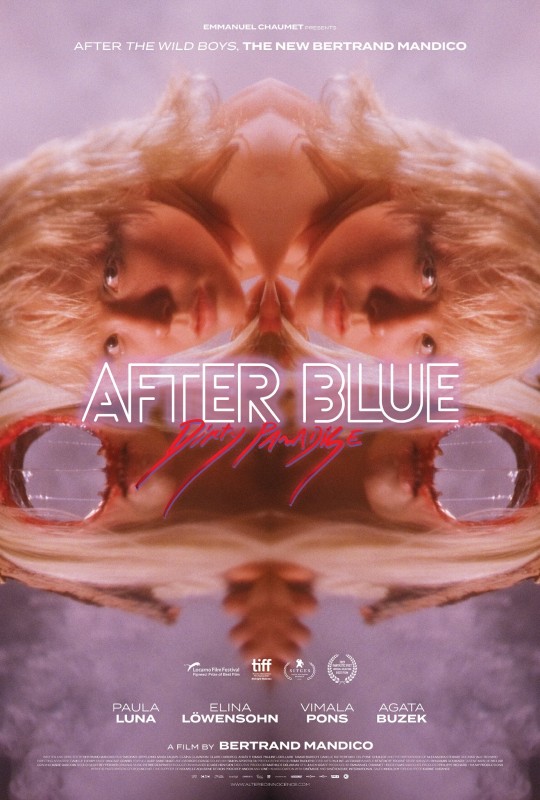
#HARPERSMOVIECOLLECTION
2024 MOVIE LIST
www.tumblr.com/theharpermovieblog
I watched After Blue (2021)
Give it up for French sci-fi. It certainly is something all it's own.
On a planet of only females, a young woman and her mother are tasked with finding and killing a criminal, whom the young woman previously freed.
French director, Bertrand Mandico, directed a film called "Les Garcons Sauvages" (The Wild Boys). A film about several delinquent boys (played by women) who kill their teacher and are placed into the care of a grizzled ship's captain. This captain takes these delinquents on a journey to a magical island which slowly alters their gender. As a person who has explored my personal gender identity, and as a movie fan, I found "Les Garcons Sauvages" oddly fascinating. The film was stylish, with a classic black and white look mixed with a sparkling dreamy quality. It was, if nothing else, interesting and provocative.
So, when I came upon "After Blue" and found out it was directed by the same filmmaker, I jumped at the chance to see it. Why? Because I love "strange" filmmakers.
I often forgive flaws in a film if that film is of a unique style. Filmmakers like David Lynch, Guy Maddin and Bruce McDonald make zero compromises. Maybe their films are too weird for the mainstream and maybe I don't like some of their work, however I immediately and veraciously seek it out. Each of them makes a film as a piece of unique art, which no other director could have, or would have, made in the same way. Truly original, and true to their singular vision. For me, Bertrand Mandico can now count himself among these filmmakers.
"After Blue" is a very strange film. One that proves to me that Mandico is obsessed with female sexuality and gender. Here, he lays the foundation of a sci-fi/western story to hold up themes of sexuality and gender, but also themes of loneliness, morality and guilt. And, while the film is deeply sexual in nature, the sexuality on display is more than mere physical desire or exploitation. Mandico uses sexuality to explore his character's wants and desires in all aspects. Doing so in a glittery dream world where sadistic women with hairy arms and blind androids with tentacle dicks roam around freely.
I very much liked this film, but I very much like weird shit that I don't get to see other places, which may taint my opinion slightly.
With it's fake-y sets.and over stylized visuals, "After Blue" looks like a stage-play and a music video had a three-way with a soft core porno, but not in a bad way. Mandico is still able to build an interesting enough world with what he has at his disposal and the story he's telling. Even if that world is often too strange for its own good.
Now, I can't exactly recommend this to anyone like it's a normal film, but if you're the type of person who's attention can be held by weirdness and sex and slime and guns named after fashion brands and a killer named Kate Bush...this is for you.
2 notes
·
View notes
Note
So serious question for your opinion: should they have ditched the Annie thing entirely and just kept the rest of the weirdness without explicitly pairing Cooper off with someone?
i had to think on this for a few hours before i answered, sorry for the delay.
season two really starts to struggle at the mid-point. if you google twin peaks season two the first recommendation is "why is season two bad?" and like... it is bad. but it's not ALL bad. i think the beginning of s2 is really strong. particularly 2x01 and 2x07 are brilliant. but after that is when 1. the execs at abc put intense pressure on david lynch and mark frost to reveal who laura's killer was which is the main plot of the show and 2. kyle threatened to leave the show full stop if they didn't drop the storyline. because of these things happening so suddenly and in succession they had to literally make things up as they went and rewrite everything they had planned to keep the audience engaged and avoid a guaranteed drop in ratings. remember that in 1991 people HAD to tune in live
i found the specific quote about it, which can be found in the essential wrapped in plastic by john thorne:
Harley Peyton: We had this big problem—-when we revealed who killed Laura Palmer, the show would be over! We needed to figure out something that would take the place of that. Mark and I figured the best thing would be to have Cooper become involved with Audrey. That was what all our mail was about, and that’s where it all was headed. It seemed like a great thing to do next, to have that love affair carry the show for about six episodes. We had planned it, but unfortunately Kyle refused to do it. So we ended up with no second season! All we had were back stories. Every story that you saw for those five episodes was meant to be a secondary and really unimportant story. Suddenly, that was all we had. And we had nothing to replace it. It was just a mess. And once Kyle was allowed to do that, all the actors felt that they should determine their storylines, too. Who can blame them? But that was less of a problem. As I said, everyone was great. Michael Ontkean was tremendous. All these guys were great because they loved it. It really was a fun job. You’d go to this place every day and you’d do the work and everyone got along pretty well. So that part of it was wonderful.
NOW!!!!! hold your horses, y'all.
i wanna say that while i am a cooper/audrey shipper, i tend to agree with kyle to a certain degree.
i think part of what makes cooper and audrey interesting is the tension within their relationship. the yearning, the wanting and not taking. mind you, kyle does not deny that cooper had feelings for audrey!
in, reflections: an oral history of twin peaks by brad dukes kyle says, "it was fun to watch that relationship and cooper's reaction to it and what he was feeling as a man and an fbi agent."
the issue really was that i think frost and payton (david lynch was also less involved in s2 which... shows) thought cooper and audrey had to have them have a physical affair and kyle refused to do that because he thought cooper wouldn't (and bc his gf was jealous of his chemistry with sherilyn, but whatever) and like- i agree? i don't think he would. i think he's deeply TEMPTED. i think he has feelings for audrey and had they not been forced to stop having screentime together that would've become more complex - but do i think cooper would have sex with audrey in s2? no. that would be a betrayal of everything he stands for. but that does not mean that cooper and audrey are not a romantic relationship.
what they should have done was negotiate with kyle more. so no explicit romantic affair with audrey, but don't completely drop ALL interactions between them! they can still build that relationship and that friendship and keep the tension without it crossing that final moral line kyle felt so strongly about and then people would have kept watching. because as we know from the x files, if there is one thing audiences love it is the will they/won't they. cooper can still fall in love with audrey, go into the black lodge to save her, and never even kiss her if you are a strong enough writer.
now, let's say they do none of this and kyle and sherilyn still have no scenes together. yes, i think annie is a bad character. not that i dislike her! i feel nothing toward her because her character and her relationship with dale are severely underdeveloped. she is clearly a stand in for audrey, down to the a in her name. but she doesn't have the same chemistry with him, and neither does she test his moral code the way audrey's did which is an important part of his character and symbolic for why he enters the lodge in the first place.
i have long thought he is bound to be in the lodge because he is bound to laura. and his relationship with audrey is part of that since audrey and laura are foils of one another - "we weren't friends but i understood her better than the rest."
david lynch said that cooper being stuck in the lodge and replaced with evil cooper was NOT the original intent as the shows ending, and that if the show had continued obviously other things would have happened. i think it would have been so powerful to have cooper face his shadow self to save a woman he has feelings for, when he feels those feelings are morally wrong. it would have been interesting for him to come out of the lodge with his soul intact because he faced it head on. it would have been interesting to see how audrey and harry and albert and everyone else would have known the doppelgänger isn't cooper (one of THE biggest l's in the return tbh) and power as hell to compare and contrast cooper not taking advantage of his position of power over audrey despite her being of age and how EVERYONE took advantage of laura and how those three characters are tied together.
if they had to completely scrap everything, i think they did the best they could and stuck the landing the best they could in that last episode. there were absolutely ways to get there that didn't include throwing a random love interest at him - but we'll never really know now what could have been.
anyway, sorry that was so long. i guess i still feel strongly about this 😩
16 notes
·
View notes
Text
Review Double Feature: Dune (2021) and Dune: Part Two (2024)
Dune (2021) and Dune: Part Two (2024)
Rated PG-13 for sequences of strong violence, some disturbing images and suggestive material (Part One)
Rated PG-13 for sequences of strong violence, some suggestive material and brief strong language (Part Two)
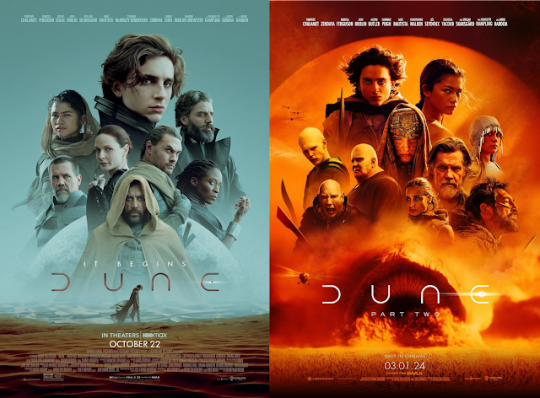
<Originally posted at https://kevinsreviewcatalogue.blogspot.com/2024/03/review-double-feature-dune-2021-and.html>
Score: 4 out of 5
Yep, we're doing the Kill Bill thing again and grading two movies together as one singular whole. And that's because, much like Kill Bill, this is no ordinary pair of movies. Rather, they're a two-part adaptation of the absolute monster of a novel that is Frank Herbert's Dune. A landmark of science fiction, it is no pulpy airport paperback, clocking in at 896 pages and covering everything from the ecology of a desert world to the use of religion as a tool of control to the fall of empires to the nature of power to a deconstruction of "chosen one" mythologies and everything in between. It's a novel that typically comes up on shortlists of the greatest science fiction novels of all time, one that's been compared to J. R. R. Tolkien's The Lord of the Rings trilogy in fantasy in the canon of modern speculative fiction. (Ironically, Tolkien disliked Dune, though he didn't really say why in the interest of remaining diplomatic.)
It's not a book you take lightly, is what I'm saying.
What's more, the very things that have made it so tempting to adapt to the screen are the same things that have long given it a reputation as "unfilmable". Attempts to make a movie out of it have bedeviled nearly every filmmaker who's tried, including some of the greatest of the modern age. David Lean was offered the film, but turned it down. Alejandro Jodorowsky tried to adapt it in the '70s and failed. David Lynch actually managed to get his movie made back in 1984, producing a film that's widely remembered, not least of all by Lynch himself, as a psychedelic mess. The Sci Fi Channel produced a miniseries in 2000 that faithfully adapted the text of the book and, despite a very large budget for a TV show at the time and a huge marketing push, proved to be just as divisive among sci-fi fans. Its influence wound up coming less through its own adaptations and more from other authors and filmmakers inspired by it to make their own, less categorically weird stories, including a number of films that emerged directly from the ashes of Jodorowsky's abortive production. (You might've heard of a few of them, like Alien, The Fifth Element, Warhammer 40,000, and even Star Wars.)
So when Canadian filmmaker Denis Villeneuve decided that he wanted to adapt Dune, many critics, film journalists, and fans predicted it would be his Waterloo. Sure, he's a modern wunderkind who's never made a bad movie, up there with Christopher Nolan as a darling of today's film buffs (and, in my opinion, one who has a better track record). Sure, he'd already done the impossible by making a sequel to Blade Runner, one of the greatest science fiction films of all time, that was just as good as the original. But if Jodorowsky and Lynch couldn't do it, then how in the world was Villeneuve, somebody whose background was chiefly in gritty, spectacle-light thrillers like Prisoners and Sicario, going to pull off adapting a novel as famously trippy as Dune?
What Villeneuve did was largely stick to the text of Herbert's novel as the miniseries did, cut a lot of the backstory and many of the psychedelic elements, and instead focus heavily on both the ecological themes of the story and the events of its present, especially its political subtext and its commentary on "chosen one" narratives. What emerges is a film duology that feels like a dark retelling of Star Wars (or at least A New Hope) in which the story of Luke Skywalker, instead of a tale of a straightforward hero saving the day, is instead a tale of the rise of the Antichrist -- and, incidentally, a far better take on the idea of "what if the chosen one turned out to be the bad guy?" than the Star Wars prequel trilogy. It's not a perfect adaptation, and honestly, I'm still not sure if a "perfect" adaptation of a novel like Dune is even possible outside of a miniseries. (Jodorowsky's version would've been ten to fourteen hours long.) But whether I was watching it at home on a big-screen TV (as I did with Part One to get caught up) or in a packed movie theater (as I did with Part Two), I got a gorgeous, compelling, slow-burn sci-fi epic filled with a rich cast of complicated characters that sets up even bigger things to come but still ends in just the right way, without a doubt the best adaptation of Herbert's novel so far and one that I expect to endure in the canon of science fiction classics just like the novel.
Our story starts over eight thousand years into the future, with humanity ruled by the Imperium, an empire in classic medieval fashion where power is divided between the Emperor and the various Great Houses of the nobility. Arrakis, a harsh desert planet that is strategically vital for its supply of spice, a drug that is necessary for faster-than-light travel to be possible, has just been transferred by the Emperor from the control of House Harkonnen, which ruled it for decades, to House Atreides. The Atreides patriarch Duke Leto knows that this is a power play by the Emperor to thwart the growing power of his family, as control of Arrakis paints a giant target on their backs for other families to go after, not least of all a bitter House Harkonnen, but he also knows that he can't openly defy the Emperor's wishes and turn down this white elephant of a gift. Sure enough, exactly what he feared comes to pass. However, when House Harkonnen took back the planet, they didn't count on one man: Paul Atreides, Leto's teenage son, who survives the initial attack with his mother Lady Jessica and runs off into the desert to live with the Fremen, the tribal native people of Arrakis who have always resented the power of outsiders over their world, and plots revenge. Unbeknownst to Paul, however, a secretive religious order called the Bene Gesserit, one that includes his mother, has plans for him, and has set in motion events that will lead to his rise as a mythical savior of humankind called the Kwisatz Haderach... but unbeknownst to the Bene Gesserit, Paul, who's been having visions of himself causing a galaxy-scale spree of death and destruction, has his own ideas as to what kind of man and leader he's going to be.
The first film opens with Chani giving a vivid description of the beauty of the desert ecosystem of Arrakis, and it's clear that the environmental themes of the story were where a lot of Villeneuve's attention lay. He keeps the exposition indirect in order to fit as much of the book into five-plus hours as he can, instead preferring to show us how the world functions: a mouse-like alien creature wiping the sweat off its ear and drinking it again, the fact that nearly all of Arrakis' human development is either underground or otherwise shielded from the brutal sun, the human population being consequently nocturnal, the status of mountains and large rocks as islands of safety amidst the sea of dunes and its terrifying sandworms, fresh water being a resource as precious as gold. This short of "show, don't tell" exposition extends throughout the story. We don't need to be told that the proliferation of personal protective force fields that only slow-moving objects can get through has made guns obsolete in industrial warfare and led to a revival of melee infantry weapons like swords, pikes, and daggers, nor do we need to be told that, against the Fremen who don't have those fancy shields, guns are still very useful. We can figure that much out just by watching how these devices function and figuring out the implications, and then doing the same with all the other neat stuff about the worldbuilding. In the book, Herbert explained the setting's retrofuturism and lack of computer technology with a lengthy backstory about a war between humans and AI called the Butlerian Jihad in which humanity's victory was followed by a thorough backlash against "thinking machines". None of that makes it into the movies, but it didn't really need to, not when the films do an expert job of crafting a society that thinks it's too good for computers, and not when it's resting on the visual shorthand of countless past space opera flicks like Star Wars. A rare case where the fact that the source material has inspired countless great movies actually works in the favor of its own adaptation, letting it spend less time on the parts of the worldbuilding that we've all seen before and instead focusing on the parts that stand out from the pack.
And the part here that stands out is a big one. Over a decade before George Lucas played a "chosen one" sci-fi story pretty much straight (and over three decades before he made the prequels as a deconstruction of such), Herbert wrote a story that portrayed prophecies, Great Man narratives, and organized religion as tools that could be easily exploited by a tyrant. Paul Atreides may have meant well, hoping to liberate the Fremen from tyranny, but by inserting himself into their struggle (with help from shadowy figures who had their own agenda in paving the way for his reign), he built something terrible, and the psychic visions he has throughout the story make it clear that his accomplishments will end in tragedy. Timothée Chalamet plays Paul initially as a rich kid struggling with the pressure placed on his shoulders, one who takes to Arrakis astoundingly well to the point that, when he's forced to leave his safe and secure life at the palace, he winds up comfortably integrating right into the Fremen's society. Throughout the films, we get hints of darkness within him, especially in Part Two once he starts delivering bombastic speeches to enraptured crowds that at some point start to sound uncomfortably like the speeches that the villains normally give in these sorts of movies. Even more than the psychic visions he has of the death and destruction to come, it was in these moments when I was both captivated by Paul's power and, more importantly, scared of the kind of leader he was growing into: a harsh, unforgiving warlord who's willing to resort to extreme measures to secure the independence of the Fremen. He's an easy guy to root for, but there's always a pit in your stomach as he slowly but surely pushes the boundaries right up to the breaking point. It's here where Chani, her role considerably expanded from the books, emerges as the film's voice of reason, serving as Paul's lover but also somebody who realizes that the Fremen are trading slavery at the hands of a colonial overlord for slavery at the hands of a cult leader, even without knowing the behind-the-scenes machinations that put Paul in his position.
That said, if it wanted to completely stick the landing here, there was one final shoe that needed to drop but didn't. Paul's psychic visions merely show him ominously as a leader with Hitler-esque undertones, as well as him in battle. The book went a lot further when it came to having Paul's visions showing him with far more than just undertones, sketching vivid displays of the misery that he is fated to cause: famine, genocide, the apocalypse on a galactic scale. What the films show us is designed to make us uneasy about Paul, while letting Chalamet's performance do the rest in making him look like a budding villain, but there's a point where "show, don't tell" can be taken too far, and that's when you're talking about prophecies of disasters to come that you can't linger on for too long in the film itself and can only tell us will happen. I was only a bit freaked out by Paul, when I should've been picturing myself in Germany in 1933. I was getting all the cool and badass parts of a great villain, but the things that actually make him a villain are still to come, and that, I think, undercut some of the menace and unease I was supposed to get from Paul. It wasn't a huge problem, but it was still a not-insignificant blotch on what's otherwise a great pair of films.
Fortunately, once you're past the plot, as a sci-fi epic this duology is gorgeous to behold. Villeneuve has always been a guy who, like Christopher Nolan, has an affection for gritty realism even when he's working with big blockbuster epics, and he made the most of the desert environments that give the story its name. He does a great job in particular imagining what big melee fantasy battles would look like augmented with futuristic technology, in which the pikemen and knights charging their enemies in the field are supported with artillery lasers. The cast is absolutely stacked and excellent all around, with Chalamet shining in the central role but everybody around him also doing great work, from Zendaya as the skeptic Chani to Rebecca Ferguson as Paul's mother with her own agenda to Austin Butler stealing the show in a surprisingly brief amount of screen time as the Emperor's depraved nephew who gets sent in in Part Two to stop Paul. It was perhaps a bit overstuffed; Florence Pugh wound up getting lost in the shuffle, not an easy feat with an actor of her caliber. I understand why Villeneuve decided to split this movie in half, because there is no real way this story could've been effectively told otherwise.
The Bottom Line
Villeneuve accomplished an impossible task here, crafting with two movies an adaptation of a legendarily dense novel that does it justice. This one has its faults, and there are things that the otherwise inferior Lynch version does better (especially with regards to its psychedelic elements), but even so, it is gonna go down in the ranks of all-time sci-fi classics. I give it a solid recommendation if you have even the slightest interest in science fiction.
#dune#dune part one#dune part two#2021#2021 movies#2024#2024 movies#science fiction#sci fi#denis villeneuve#timothée chalamet#zendaya#rebecca ferguson#oscar isaac#josh brolin#stellan skarsgard#dave bautista#jason momoa#javier bardem#austin butler#florence pugh#christopher walken#lea seydoux
4 notes
·
View notes
Text
It's still Halloween right?
Lets talk about Twin Peaks inspired stuff. There's this game called "Who's Lila?" that gets it. Twin Peaks inspired quite a lot of people to create very weird and off beat stories about small town America but almost none of them, even the complete ripoffs really get what's going on with it. I mean to be fair, it was only a few years ago that someone made a really huge video breaking down what Twin Peaks was actually about with references and sources galore. Without that you could be like Jay Bauman and just consider the existence of the series of a fun novelty that is barely worth thinking about.
Almost treating a highly influential show as if it were some shlock that you watched for an internet retrospective.
So what do people get wrong? Well, the whole point of Twin Peaks was that the murder is the hook but the town itself is what causes you to stay. It's not that Laura Palmer's death doesn't matter, in fact it's the opposite. Laura Palmer's death is so substantial that you don't want to move onto to the next murder, you want to get to know the world that Laura left behind and who Laura was when she was alive.
David Lynch hated the fast food style murder mysteries were being written and wanted to make the ultimate anti murder mystery.
And, he failed. But not because he's a hack fraud writer. Both fans of the show and the producers wanted a resolution to the murder case. Once they did that Laura could be discarded mentally and the show declined. He made Fire Walk With Me to reignite value in knowing and caring about Laura Palmer but David Lynch is a moon man that doesn't want to spell things out even when it would benefit him greatly to do that maybe like once? Ya know. If it would save his entire franchise?
But no. After many years a season 3 is made but it's just Lynch killing his franchise as a way to curse those who were just too ungrateful and blind to see his vision.
Twin Peaks inspired media make the same mistake but without even knowing what David Lynch really wanted from the show so you get weird quirky middle America stories that either have a weird mystery cult or goes from one murder to many murders (and in the case of Deadly Premonition it's both).
And it's not all bad. In fact most of these things are good. Gravity Falls is probably the best show to ever do the face value aspect of Twin Peaks right.
But only Who's Lila has managed to capture the meta of Twin Peaks and what David Lynch was trying to do with it.
A user named Flawed Peacock has made a 7 hour video breaking down the game (oddly enough about as long as the video breaking down Twin Peaks) but you can play it for yourself if you like ARGs (and you have to if you want to figure out everything for yourself). But if you just want me to tell you now....
Who Lila is, is a meta question. Lila is a character whose motivations and actions and all the stuff that feels like Twin Peaks is in the game, but WHO LILA IS, is just an idea. The game morphs from the story about a murder to it really being about how a memetic idea is created and takes on a life of its own and exists only in our minds.
Lila exists as long as we think of them, they are an idea that feeds off of people's interest in what it is. Once you stop thinking of Lila, Lila exists a little less but idea's never die so Lila not only exists perpetually in the game but in the real world as well because all it takes is reading the word "Lila". Thinking about Twin Peaks inspired media, maybe even seeing the psone graphics or the art design or the sound design. Maybe just seeing this face

Or thinking of a murder mystery, or the demon Lilith makes you think of Lila and just like that Lila is back.
A demon is in your mind absorbing your thoughts and even though you played the game and you watched the 7 hour break down of the game and you are writing an article on Tumblr about Lila, you can't get rid of Lila.
And this is why Who's Lila is the best Twin Peaks inspired story to exist yet because all David Lynch was trying to do was sanctify the art of film media through the death of Laura Palmer, Laura Palmer was his Lila and the audience was supposed to keep asking who Laura Palmer is but they didn't care. They just wanted to find out who the murderer was and move onto the next case, but no one who plays Who's Lila will be moving onto another case. Sure, once you do absolutely everything, you can come to a conclusion you can settle with but by that point Lila is pretty well cemented into you. She's not a jumping off point for throw away content. It's the heart of the world her story takes place in.
Perhaps now that I understand and have seen this stratagem in action, I too can make a true Twin Peaks meta story....
6 notes
·
View notes
Text
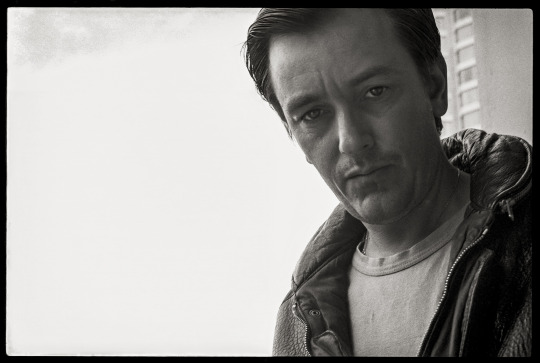
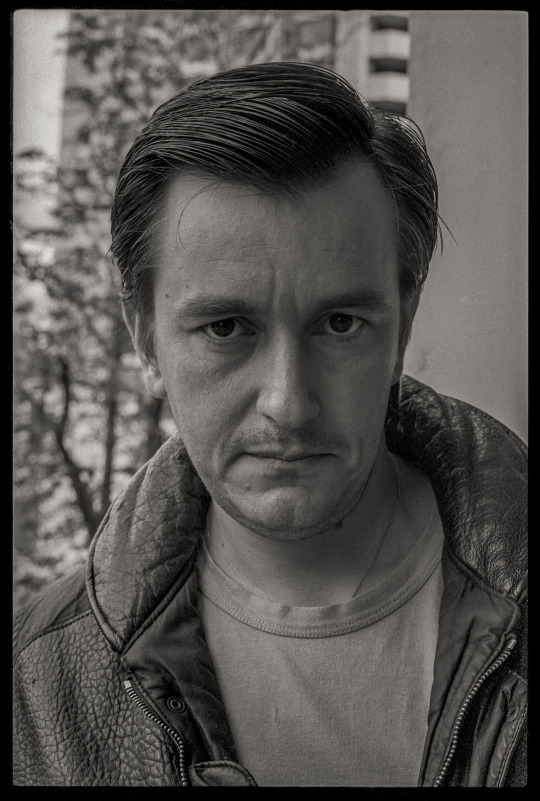
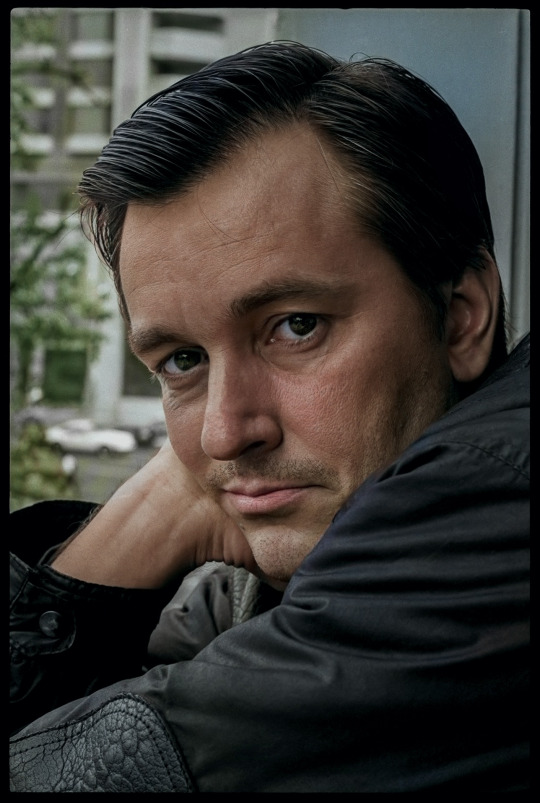
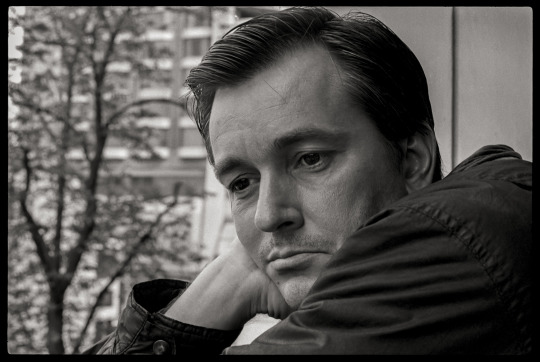
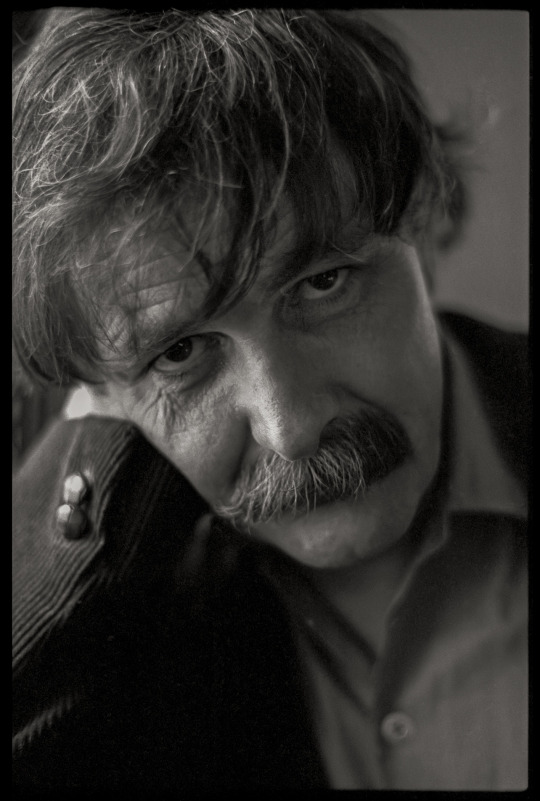
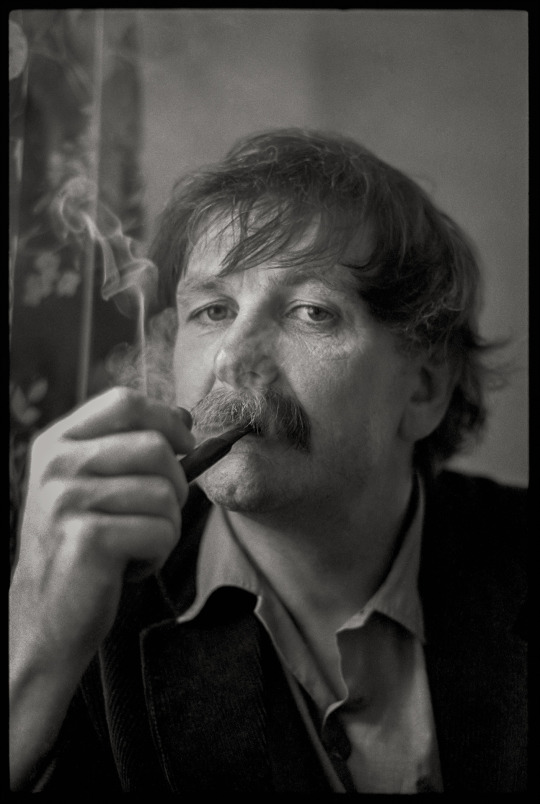
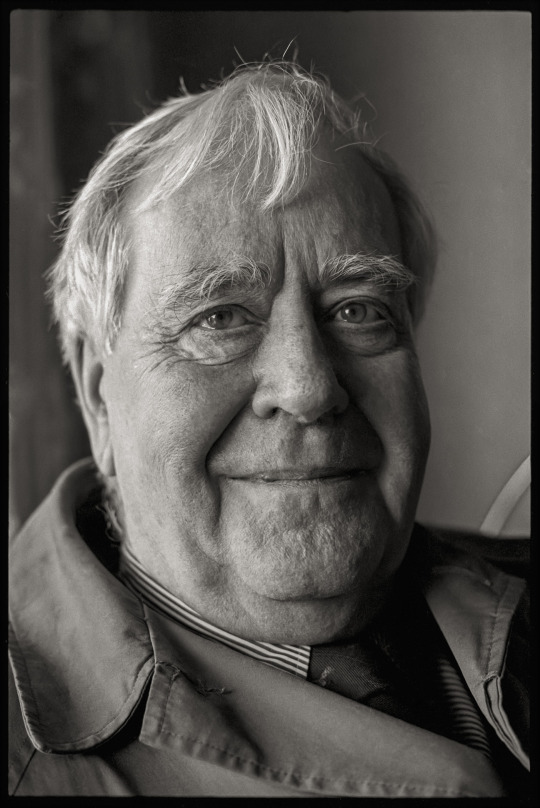
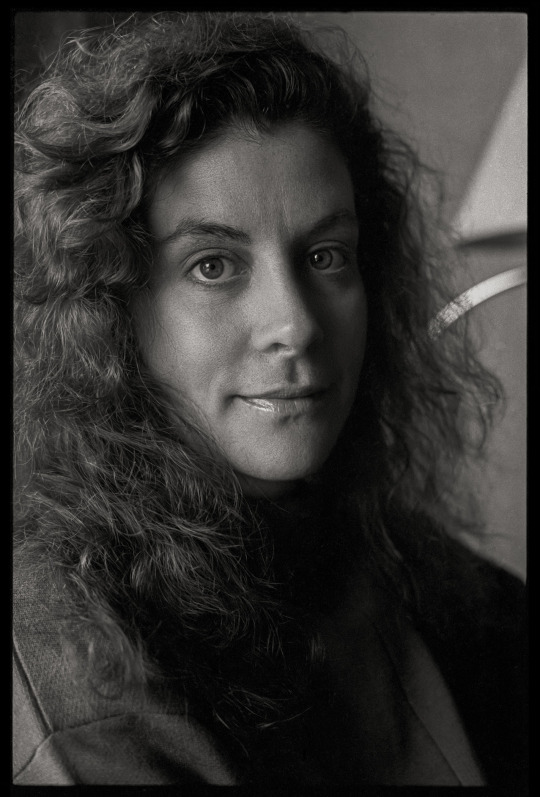
JEAN-JACQUES BEINEIX, PAUL COX, HORTON FOOTE 1989 Toronto International Film Festival
The 1986 film festival was the first I covered as both a writer and photographer, and was the beginning of a quarter century of regular portrait work every September in the rooms of whatever hotels were hosting the guests and publicity suites that year. It was so much easier in 1986, before the big movie PR professionals showed up en masse, and you could still book nearly every shoot and interview through the festival's own press office. Besides David Lynch - my big score that year - I photographed people like Dutch-born Australian director Paul Cox.
I was a fan of Cox after his films Lonely Hearts and Man of Flowers, and he was here promoting Cactus, starring Isabelle Huppert. I wish I'd known at the time that Cox had started his career as a photographer - Google was decades in the future - but it explains why he was so comfortable posing for my camera, despite my inexperience (I had only bought my Pentax barely a year and a half before). Cox was passionate and adamant - he had no patience for the big studios and the mainstream filmmaking that he considered the enemy of small, independent pictures like his. I remember leaving the interview chastened and inspired - practically a convert to his worldview. Cox would continue to make films for nearly three more decades, but this period probably marked the peak of his profile as a festival director. Paul Cox died in 2016.
Another director I photographed at the 1986 film festival was Jean-Jacques Beineix, who I'd first heard about when his film Diva was a huge hit at the festival five years previous. He'd hit a rough patch with his next film, Moon in the Gutter, but made a comeback with Betty Blue, the film he brought to the Toronto festival that year. Films like Diva and Betty Blue, as well as directors like Beineix, Leos Carax and Luc Besson, were dubbed cinéma du look by French critics, and I remember how exciting they seemed at the time. It was, looking back, very much the sort of thing that would appeal to a young man - romantic and stylish and full of angst - and while I think Betty Blue is still worth seeing (though it would never be made today), I'm not sure that Diva has held up well.
Beineix had been through a lot in the last few years and I suppose it showed in these photos. I considered one of these frames unprintable back then, very far beyond my meagre darkroom skills, but I have managed to rescue it today thanks to superior scanning skills and the assistance of neural AI filters in Photoshop. The result looks like a still from an old nouvelle vague film, with Beineix in the role of Belmondo or Delon. Jean-Jacques Beineix died of leukaemia in Paris in 2022.
Horton Foote and his daughter Hallie were at the 1986 film festival promoting On Valentine's Day, the second film in a trilogy of pictures based on his plays set in the Texas of Foote's childhood, which starred his daughter in a role based on Foote's mother. Today everyone probably knows Foote for his Oscar-winning screenplay for To Kill a Mockingbird. He reccommended Robert Duvall for the role of Boo Radley in the film, and years later Duvall would play the lead role in Tender Mercies, which would get Foote another Oscar nomination and win Duvall one for Best Actor.
Foote also wrote scripts for pictures like Baby the Rain Must Fall, Of Mice and Men and The Trip to Bountiful - the latter based on his own 1953 teleplay, which went on to Broadway. Foote was the cousin of historian Shelby Foote, who wrote the 3-volume history that was the basis for Ken Burns' documentary series The Civil War, for which Foote provided the voice of Jefferson Davis. I photographed Horton and Hallie Foote simply, in a chair by the window of a room in the Park Plaza (now the Park Hyatt) hotel; the similarity of the poses and lighting ended up underscoring the family resemblance. Hallie Foote still works, mostly in theatre; Horton Foote died in 2009.
(From top: Beineix, Cox, Horton & Hallie Foote)
#jean jacques beineix#paul cox#horton foote#hallie foote#portrait#portrait photography#toronto#photography#black and white#film photography#director#photographer#some old pictures i took#old work#toronto international film festival#1986
3 notes
·
View notes
Text
I get a sick sense of satisfaction with people who don’t like David Lynch because okay sure fine. It doesn’t matter if you like him or his films or not. There’s lots of reasons to not like him or his films. They’re too abstract and grotesque for some, but Lynch finds his mummified cat on the ground beautiful for other reasons too. And he absolutely refuses to disclose why. He started out not making film for an audience but to presumably “live the art of life.” To attach onto something that resonates with you and fish it out of the chaotic infinite dream space and let it display itself out in the open, it seems as though he is seeking purity of expression, but I think that is something Lynch realized early on that there is a contradiction inherent to purity. He refuses to explain as dissecting his work would be a disservice and negate the point. His films in a way are a kind of Rorschach test. It can seem obvious also to some with supposed literary skill what is going on in his head: particularly Eraserhead seemed pretty straightforward and relatable in its basic premise to me. But as he dives deeper and the nebulous depictions become more generalized that’s where the frustration lies and interpretation varies. After Eraserhead, Lynch said he wanted to keep his audience more in mind, partly because he didn’t realize it would be so widely seen. I feel that after that, he wanted to share this form of introspection, and it almost seems like a challenge, “figure out what the hell Lynch means by XYZ.” But I think that is not necessarily the point—sure great if your brain lines up exactly with Lynch’s, but that is rather sad and reductive if you visualize art that way. Or is it beautiful that through the chaos two souls have reached a common understanding? Only one interpretation being The Correct One, is it beautiful or suffocating? David Lynch didn’t die, we killed David Lynch and he thanked us for it.
#rip david lynch#is this projection or#death of the author#eraserhead#the unexplainable hilarity of the elevator scene and the family dinner scene give me faith in humanity
0 notes
Text
This is why I fell down the rabbit hole in my younger years.
I am not a Jew Hater anymore. I try to make up for it now by being yall's ally.
Like recently I looked at the wikipedia page for “Pogrom” and I was so furious because I saw what they were doing in their narrative. It inflamed me because I could see the tricks they were using so clearly now. Use a jewish word about jewish suffering, diminish the sheer catastrophic horror inflicted on the jews, then use that word to describe things done to gentiles & make it seem like its far worse. Like "The most significant pogrom which occurred in Nazi Germany was the 1938 Kristallnacht. At least 91 Jews were killed." and then a little further down it uses the word to describe how thousands of non-jews were killed in "pogroms" and even inverting the language to say that violence involving ISRAELI settler was a pogrom of the Palestinians. Then they have the fucking gall to make it seem like only one significant person, David McFucking Cameron, considered October 7th a pogrom when it absolutely unequivocally was. And the more you read the worse it gets.
The article spends FAR more time talking about how the word Pogrom "applied" to other non-jewish groups, including groups actively hostile to Jews. They co-op Jewish words about Jewish suffering in the same way far leftist Jew Haters try to make the Shoah about THEM and that THEY are the real victims of the Holocaust.
And other pages that would otherwise have nothing to do with Judaism are feeding the narrative, like the wikipedia page for the Red Hand of Ulster. It talks primarily about it being about ireland, which makes sense, but then when talking about how other groups have used red hands as symbols, they add in this deception: "It is also used by Jews, Muslims, and can be 𝗳𝗼𝘂𝗻𝗱 𝗶𝗻 𝘂𝘀𝗲 𝗶𝗻 𝗣𝗮𝗹𝗲𝘀𝘁𝗶𝗻𝗲 𝗮𝗻𝗱 𝗠𝗼𝗿𝗼𝗰𝗰𝗼." 𝑰 know why its used in Palestine and Morocco, and 𝙔𝙊𝙐 know why its used in Palestine and Morocco, but its a complete deception hiding behind a veil of truth. It's the bloody hands of Aziz Salha who was part of the lynch mob that killed two Jews. Its the same hand that celebrities wore on pins during the Oscars. But by adding "It is also used by Jews" to the beginning, they throw doubt on its use as a hate symbol in Palestine and elsewhere.
Sorry not sorry, I got lost in an angry fugue there, because now that I can see it clearly, I see all the ways I was tricked into hating yall as a teen and young adult. And it makes me incredibly worried and angry about how its ensnaring other young people into that barbaric hate cult. If it worked on me it is definitely working on others, and we can see that everywhere now online and in protests across the world.
I am so very grateful for the Jewish friend I made who, with incredible patience and grace, set me straight and helped deprogram the propaganda in my brain. I stand with yall now. Solidarity, friends.
Friendly reminder that you simply cannot use wikipedia as a reference for anything having to do with jews, judaism, israel, etc etc
#leftist antisemitism#jew hatred#shoah#lynch mob#pogrom#oct 7th#Ramallah lynching#Aziz Salha#you are not immune to propaganda
990 notes
·
View notes